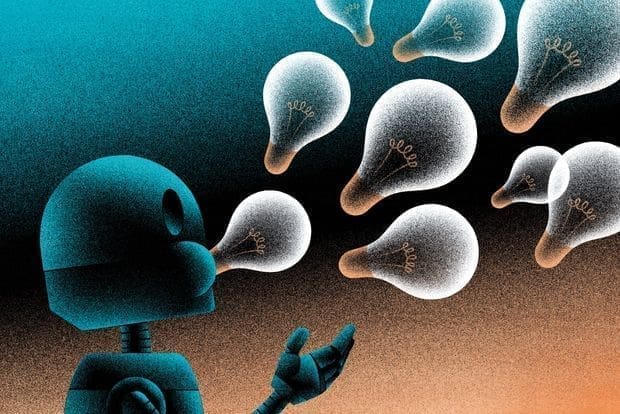Artificial intelligence brings a whole new dimension to launching a firm, from concept generation to marketing strategy development.
Artificial intelligence is poised to transform how entrepreneurs start businesses—and their chances of success.

OpenAI’s ChatGPT, Microsoft’s Bing, and Google’s Bard can help with practically every aspect of launching a firm, from coming up with a concept and testing it to doing customer research and developing a marketing plan. They do certain tasks faster and more efficiently than a human could, and in ways that a human cannot.
“In 12 months, it’s going to be a very different way of starting a company,” says Steve Blank, a retired entrepreneur who helped build tech companies such as MIPS and Convergent Technologies and is an investor in an AI cancer-diagnosis startup.
The following are some of the ways AI may help entrepreneurs, as well as some limits of the technology.
Creating the brilliant idea
The first step in starting a business is identifying an unmet need. It involves imagination and intuition, as well as meticulous study and a careful balance of risk and reward. And it’s possible that AI will be able to do this faster and more efficiently than any human ever could.

These systems “could eventually become some of the best identifiers of unmet human needs in history,” according to David Schonthal, head of entrepreneurship programs at Northwestern University’s Kellogg School of Management.
This is because AI can process massive quantities of data and go through it to determine what consumers would desire in the marketplace. “AI reads a bunch of data to identify patterns in that data, it acts upon what it senses and then it learns based on what it puts out in the world,” Schonthal explains.
That’s what business owners do, he explains. Entrepreneurs, on the other hand, “are limited by the constraints of their own capacity, reach, and biases,” he claims. “AIs have an exponentially wider set of data to learn from.”
Examining the competition
Sure, entrepreneurs may believe they have a brilliant company concept. But possibly a dozen individuals have already considered it. The large datasets from which AI systems draw can give a broader research reach than standard internet searches.
Entrepreneurs may use artificial intelligence to see what has been documented about a business proposal in technical papers, financial filings, and news stories. They can go through marketing and customer surveys, as well as what has been written about comparable startups on social media. They can observe which sorts of startups failed and which flourished.
Putting the notion to the test
Even if entrepreneurs believe their business concept is sound and deserving of financing, they must put their theory to the test. AI might assist by acting as a consumer based on a digital profile provided by the founders.

For example, if a business idea concerns the dentistry industry, entrepreneurs may instruct an AI system to pose as a dentist with 20 years of expertise who operates their own practice. The entrepreneur would next inquire about the restrictions the “dentist” experiences in doing his or her duties, as well as if the suggested product or service would be beneficial.
“You can have a reasonable interview with it,” adds Mollick of the dental character. “You won’t get the same stuff out of a person. However, if it aids in the refinement of a concept, it is extremely beneficial.”
Developing a business pitch
AI might also assist entrepreneurs create and assess company proposals for venture capitalists. It may also assist an entrepreneur in determining which VC companies support certain sorts of startups—and which they reject.
Mollick had one of his courses construct company ideas, which were then critiqued by an AI system programmed to act like a venture investor. The AI system told the students if it felt the plans were innovative, possibly profitable, met a market need, and sufficiently accounted for aspects like competition and scalability.

